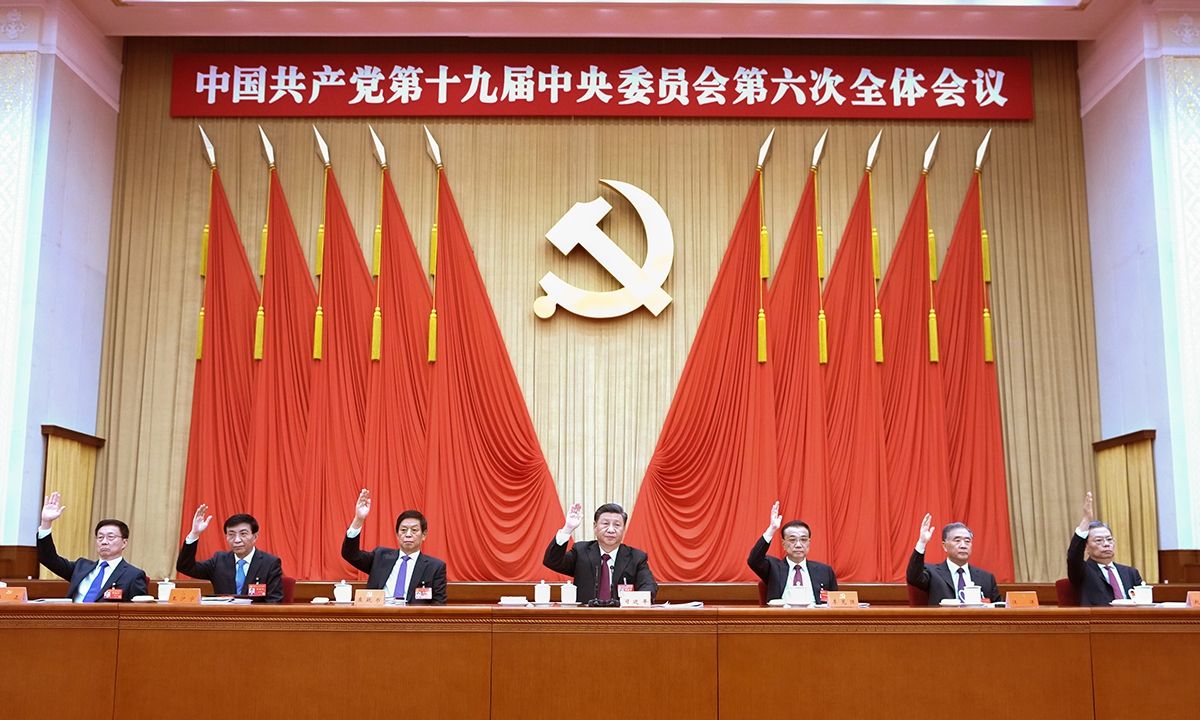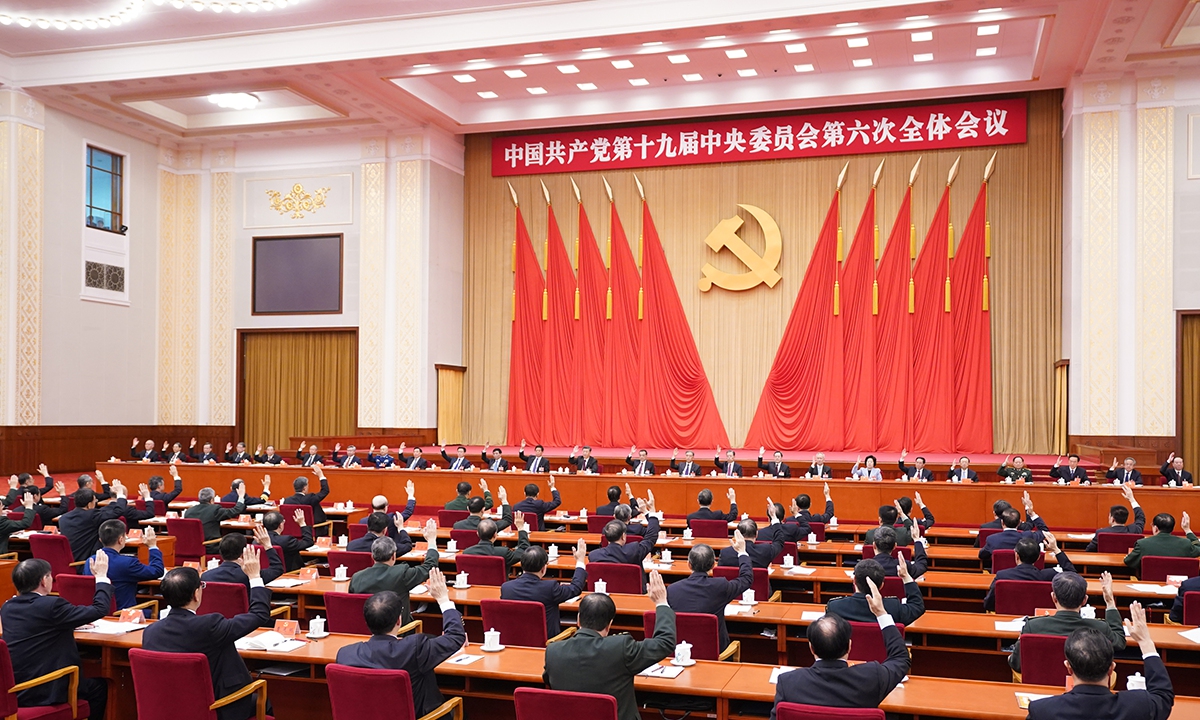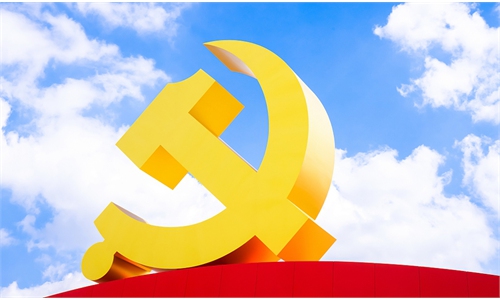CPC plenum passes landmark resolution 'to sum up achievements, experiences; guide future journey'
Central Committee with Xi at core prompts ‘historic achievements’

The sixth plenary session of the 19th Communist Party of China Central Committee is held from November 8 to 11, 2021 in Beijing. Photo: Xinhua
A high-profile meeting of the Communist Party of China (CPC) has adopted a landmark resolution on the major achievements and historical experience of the CPC's 100 years of endeavors, according to a communiqué released on Thursday, with senior Chinese political experts saying the plenum has reaffirmed and strengthened that "the Party's leadership with a strong core" is the key to answering the questions: "Why were we successful in the past? How can we continue to succeed in the future?" and it's also unshakable for China to face future challenges and realize its national rejuvenation.According to the Xinhua News Agency, the resolution was reviewed and adopted at the sixth plenary session of the 19th CPC Central Committee, held in Beijing from November 8 to 11, said the communiqué of the plenum.
Xi Jinping, general secretary of the CPC Central Committee, made an important speech at the session.
The plenum is "a milestone meeting not only for the history of the CPC and the People's Republic of China, it also officially unveiled a new historical journey in the country's great rejuvenation," Zhang Shuhua, director of the institute of political sciences of the Chinese Academy of Social Sciences, told the Global Times on Thursday.
Yang Xuedong, a professor of political science at Tsinghua University, pointed out that the most prominent feature of this communiqué is the summary of the main tasks in the four historical periods and the important experiences in ten aspects accumulated over the past 100 years.
Compared to the previous six plenary sessions, the meeting this week summarized experiences on why we succeeded, boosting confidence, and those experiences will also be very meaningful to the world, Zhang said, noting that "Given the complex situation globally, those experiences are highly valuable, underscoring China's power, theory, consistency, and spirit, as the CPC is also the world's largest political party and the most powerful political force."

The Political Bureau of the Communist Party of China (CPC) Central Committee presides over the sixth plenary session of the 19th CPC Central Committee in Beijing, capital of China. Photo: Xinhua
Achievements and experiences
According to the released communiqué, while summarizing the key achievements in the 100-year history of the Party, the session has divided history into four different periods in which Chinese communists, with Mao Zedong, Deng Xiaoping, Jiang Zemin, Hu Jintao and Xi Jinping as chief representatives, achieved a series of historic achievements - the period of the new-democratic revolution (Mao); the period of socialist revolution and construction (Mao); the new period of reform, opening up, and socialist modernization (Deng, Jiang and Hu); and the new era of socialism with Chinese characteristics (Xi).
Analysts said the plenum's summary of this history is like making the 100-year journey a "relay race", as different generations of Chinese communists have all accomplished their missions and overcome challenges in their own periods, and laid the foundations and created conditions for the next generation to achieve new goals, while their final destination is always the same, just as the communiqué said: "Seeking happiness for the Chinese people and rejuvenation for the Chinese nation its mission; staying committed to communist ideals and socialist convictions."
In the first one - the period of the new-democratic revolution, the major tasks of the Party "were to oppose imperialism, feudalism, and bureaucrat-capitalism, seek national independence and the people's liberation, and create the fundamental social conditions for realizing national rejuvenation," according the communiqué.
"Chinese communists, with Comrade Mao Zedong as their chief representative…put an end to China's history as a semi-colonial, semi-feudal society, to the rule of a handful of exploiters over the working people, to the state of total disunity that existed in the old China, and to all the unequal treaties imposed on our country by foreign powers and all the privileges that imperialist powers enjoyed on our land."
In the second one - the period of socialist revolution and construction, the major tasks of the Party "were to realize the transformation from new democracy to socialism, carry out socialist revolution, promote socialist construction, and lay down the fundamental political conditions and the institutional foundations necessary for national rejuvenation."
Chinese communists, with Mao as their chief representative, and the Chinese people showed the world that "the Chinese people were not only capable of dismantling the old world, but also of building a new one, that only socialism could save China, and that only socialism could develop China."
The Chinese communists with Deng, who was also the chief designer of China's reform and opening-up, as their chief representative have started the third period - the new period of reform, opening up, and socialist modernization. In this period, the major tasks "were to continue exploring the right path for building socialism in China, unleash and develop the productive forces, lift the people out of poverty and help them become prosperous in the shortest time possible, and fuel the push toward national rejuvenation by providing new, dynamic institutional guarantees as well as the material conditions for rapid development."
Chinese communists with Jiang and Hu as their representatives have also played their part in the third period. From late 1980s to 1990s, China has experienced the political turmoil between spring and summer in 1989, and the collapsed of Soviet Union and the fall of other former socialist states in Central and Eastern Europe have also brought serious challenge to the socialism in China. For Jiang's generation of Chinese communists, the communiqué said that "In the face of complex domestic and international situations and serious setbacks confronting world socialism, they safeguarded socialism with Chinese characteristics."
For Hu's generation of Chinese communists, "Taking advantage of an important period of strategic opportunity, they focused their energy on development, with emphasis on pursuing comprehensive, balanced, and sustainable development that put the people first."
And following the Party's 18th National Congress in 2012, socialism with Chinese characteristics entered a new era, said the communiqué.
Wu Xinwen, a professor and expert on Marxism at Fudan University in Shanghai, told the Global Times that missing any of these steps taken in the past 100 years, the CPC would not have been able to reach the historic glories and remarkable successes that it has today in the new era, and the plenum has also summarized the experiences, or the keys as to why the CPC, generation after generation, can continue its march in the right direction, to overcome challenges and realize effective self-correction.
According to the communiqué, "the Party has led the people in great endeavors and accumulated valuable historical experience over the past century. This covers the following ten aspects: upholding the Party's leadership, putting the people first, advancing theoretical innovation, staying independent, following the Chinese path, maintaining a global vision, breaking new ground, standing up for ourselves, promoting the united front, and remaining committed to self-reform."
These ten points represent valuable practical experience gained over long term and intellectual treasures created through the joint efforts of the Party and the people. All of us must cherish them, uphold them over the long term, and continue to enrich and develop them in practice in the new era, said the communiqué.
New era and future
Following the Party's 18th National Congress, when Xi becomes the general secretary of the CPC Central Committee, socialism with Chinese characteristics entered a new era. The major tasks facing the Party in this period are to fulfill the First Centenary Goal (building a moderately prosperous society in all respects), embark on the new journey to achieve the Second Centenary Goal, and continue striving toward the great goal of national rejuvenation, said the communiqué.
In the new era, the Central Committee, with Xi at its core, "has demonstrated great historical initiative, tremendous political courage, and a powerful sense of mission…has solved many tough problems that were long on the agenda but never resolved and accomplished many things that were wanted but never got done. With this, it has prompted historic achievements and historic shifts in the cause of the Party and the country."
Analysts said that in the previous period, the major tasks were mainly about development and maintaining a low profile in the international community, so there were "many tough problems that were long on the agenda but never resolved" and "many things that were wanted but never got done," because in the previous period of reform and opening-up, the conditions for resolving those problems were not ripe, and only by successfully accomplishing the major tasks in the previous three periods with the efforts of the Chinese communists of Mao, Deng, Jiang and Hu's generations, the Chinese communists with Xi as the chief representative would have the chance to solve them in the new era.
One of the toughest problems is the weakening of the Party's leadership in some aspects, and this has caused a series of problems including long-standing corruption, environmental pollution, increasingly unstable and insecure situations in some regions like Xinjiang Uygur Autonomous Region and the Hong Kong Special Administrative Region, experts said.
"Since the Party's 18th National Congress, there has been greater unity among all Party members in terms of thinking, political resolve, and action. The Chinese people have witnessed the stronger capability of the Party to provide political leadership, give guidance through theory, organize the people, and inspire society," Yang said.
Wu said this has given the Party a powerful weapon to the Chinese communists with Xi as their chief representative to wipe out those tough problems in about a decade. For instance, the problems in Hong Kong and Xinjiang have not just appeared in recent years but have been long-existing problems for decades, and now the CPC has the strength and conditions to solve them with decisive and powerful measures.
The Party has established Comrade Xi Jinping's core position on the Party Central Committee and in the Party as a whole and defined the guiding role of Xi Jinping Thought on Socialism with Chinese Characteristics for a New Era, the communiqué said.
"This reflects the common will of the Party, the armed forces, and the Chinese people of all ethnic groups, and is of decisive significance for advancing the cause of the Party and the country in the new era and for driving forward the historic process of national rejuvenation" the document stated.
In terms of geopolitical rivalry, the Party leadership definitely plays the most critical role and the CPC Central Committee is a strong leading collective, Zhang said, noting that the powerful authority and strong core of the leadership - Xi, who has a "core position on the Party Central Committee and in the Party as a whole" according to the communiqué - has proven that he can push forward the anti-corruption campaign to effectively exclude problematic officials with huge influence, or "big tigers," from the Party and to create a clean atmosphere; and to push forward a determined military reform to reshape the People's Liberation Army and offer it new strength to win against any enemy at present and in the future.
The leadership of the Party is the first thing that should be insisted on in the following 100 years, said Zhang Xixian, a professor at the Party School of the Central Committee of the CPC, as this is the most fundamental element of other coming experiences, and the most important key that will help the CPC to achieve new goals in the new era and the future.






